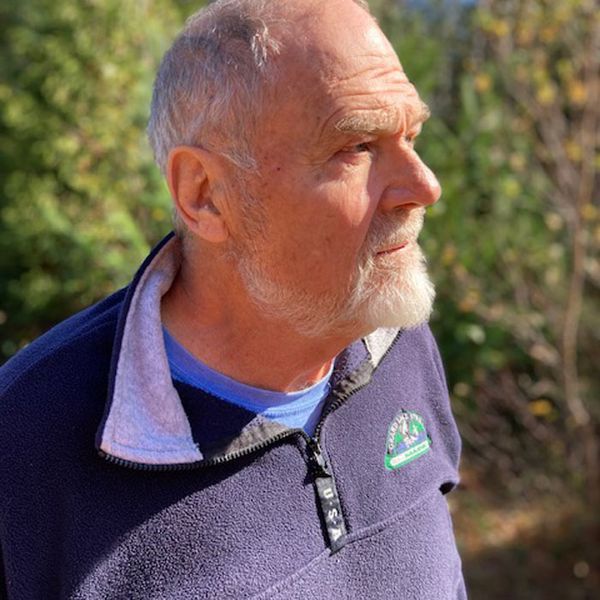Lia Purpura, Decaying Wood (detail), featured in AGNI 102
At 74, I Whistle
George MacArthur was a great one for whistling through his teeth.
He was, however, more renowned for other things. During the autumn of 1929, for example, he cut railroad ties, or sleepers, as they were known here in the north country, out on Lake Wabassus, whose name local people have always shortened to “Wabass.”
George made it a point to memorialize every significant season of his life and labor in song. He’d borrow a well known tune for the melody, and string his own words upon it. That fall of ’29 resulted in “The “Wabass Cannonball.”
I remember each note and verse:
Listen to the jingle, the rumble and the roar;
You could hear the ice a-bucklin’ up and down old Wabass shore.
When I arrived at old Wabass Lake, ‘twas early in the fall,
And Belding’s crew was glad to meet the Wabass Cannonball.
I asked Belding for a job, and he filled me with surprise,
When he said “Go take your sleeper axe and start in makin’ ties.”
There was about a week and a half when the sun never shone at all,
The air was filled so full of chips by the Wabass Cannonball.
Then we went up to old Third Lake to have a little cheer,
And drove the length of Slaughter Point to try and shoot a deer.
Well, the big buck came down Slaughter Point, and he had no horns at all,
‘Cause his face was filled with buckshot by the Wabass Cannonball.
Then the warden came into our camp and they thought they had us beat,
For cooking in an iron pot they found a little meat.
Then they hauled us into court but they had no case at all,
And the both of them were BEAT TO HELL by the Wabass Cannonball!
I may know why I thought about all this at dawn last May, alone in my room at the Park Hotel, which overlooks lovely Lake Bled in lovely Slovenia, even if this is a world about as far from Wabass as most I could conjure. I was to give a talk that day at a literary conference, in which I’d been asked to answer at some length this question: Where do poems come from?
If I had been completely truthful, as I wasn’t, I’d have answered by saying, “I don’t really know.” Fact is, poems just come. Or at least they used to. For the better part of my adulthood, they have simply been facts of life. I could say I learned as much from George: your experience brings you a poem—or not. Poems come—or they don’t.
Their coming is rarer for me now than in prior days, and at times I worry that my own will to string words onto experience may have retreated, indeed may have all but vanished. In any case, lately I often wake up with others’ tunes in mind.
Then I whistle them all day.
George could test people’s patience by the same habit: he whistled too, especially in hours of idleness, but at least the words in his head, I’m certain, belonged to him alone. I drive my poor wife to distraction with this all but tuneless whistling of compositions that have nothing to do with any creative spark of mine. It’s almost as though I’ve surrendered proprietorship of my own language.
Of course I’ve gone through similar periods of self-doubt before; they just haven’t been so protracted and unsettling.
Be all that as it may, I don’t romanticize when I say that George had a substantial literary influence on me. And yes, if it sometimes seems that what remains to me is just a patch on what my words once sought, if I can manage little but a less than birdlike song, this doesn’t mean I love those worlds any less than once I did.
This whistling is puny, and yet it’s likely still a stab at making the various worlds I’ve known or heard about cohere, no matter that the deeper those worlds sink into memory, the shallower my breath, the thinner my tune.

Sydney Lea
Sydney Lea is the author of twenty-four books: a novel, five volumes of personal essays, three of critical essays, and fifteen poetry collections, including the forthcoming What Shines (Four Way Books, 2024). A finalist for the Pulitzer Prize and winner of the Poets’ Prize, he is founding editor of New England Review. He served as Vermont’s poet laureate from 2011 to 2015, and in 2021, he received the state’s most prestigious arts distinction: the Governor’s Award for Excellence. (updated 4/2023)
